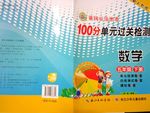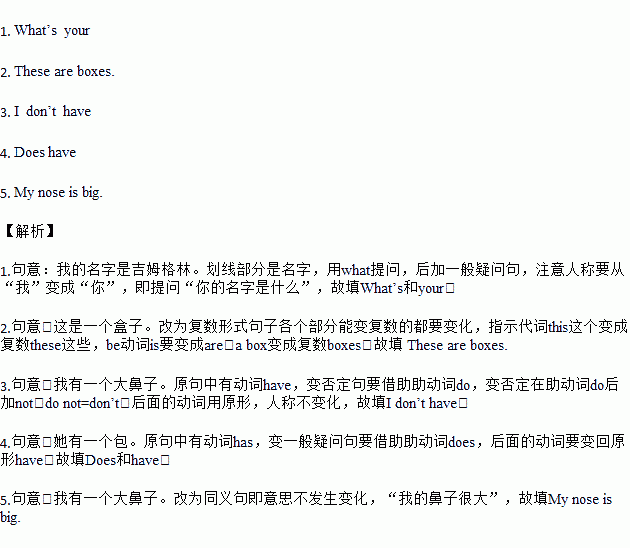题目内容
VI. 句型转换。
1.My name is Jim Green. (对划线部分提问)
__________ __________ name?
2.This is a box. (改为复数形式)
____________________________________________
3.I have a big nose. (改为否定句)
_________ _________ _________ a big nose.
4.She has a bag. (变为一般疑问句)
_________ she _________ a bag?
5.I have a big nose. (改为同义句)
____________________________________________
1. What’s your 2. These are boxes. 3. I don’t have 4. Does have 5. My nose is big. 【解析】 1.句意:我的名字是吉姆格林。划线部分是名字,用what提问,后加一般疑问句,注意人称要从“我”变成“你”,即提问“你的名字是什么”,故填What’s和your。 2.句意:这是一个... 智慧课堂密卷100分单元过关检测系列答案
智慧课堂密卷100分单元过关检测系列答案 单元期中期末卷系列答案
单元期中期末卷系列答案Name | Hair | Eyes | Nose | Height (身高) |
David | short, brown | green | big | 1.65 metres |
Mary | long, red | blue | big | 1.5 metres |
Jack | black | brown | small | 1.65 metres |
根据表格内容,判断句子的正(T)误(F)。
1.David has short, black hair.
2.Mary’s eyes are brown.
3.Jack’s hair is black.
4.Mary and Jack both (两者都) have a big nose.
5.David and Jack are the same (相同的) height.
1.F 2.F 3.T 4.F 5.T 【解析】这则表格简单介绍了三位同学的发色、眼睛、鼻子和身高。 1.句意:大卫头发短,是黑色的。根据表格中有关David的信息,可知David的头发是short; brown。原陈述错误,故填F。 2.句意:玛丽的眼睛是棕色的。根据表格中有关Mary的信息,可知Mary的眼睛是blue蓝色的。原陈述错误,故填F。 ...
In China, more and more villagers have left home to make a living in big cities. As a result, their children have become leftover children (留守儿童) and they need more care. The survey below is from some villages in China. Three hundred children were chosen to answer the questions.
What they want | Love | Pocket Money | Freedom | Control | Something else |
40% | 18% | 28% | 10% | 4% | |
Who to talk with | Oneself | Family members | No one | ||
27% | 55% | 18% | |||
Communicate with their parents freely or not | Yes | A little difficult | No | ||
46% | 44% | 10% | |||
The way they like to live | Living with parents | Living without parents | No idea | ||
58% | 14% | 28% | |||
What they think of their parents’ Working in cities | Bad | Good | No idea | ||
20% | 39% | 41% | |||
Happiest place | School | Home | Friend’s home | ||
48% | 34% | 18% |
1.In the survey, the children were asked about many things EXCEPT ______.
A. places they like B. pocket money
C. their needs D. their parents’ working in cities
2.Of all the four things, the leftover children need ______ most.
A. love B. money C. control D. freedom
3.Which of the following is True according to the passage?
A. About 18% of the leftover children often talk with their family members.
B. All the children like to stay at home without their parents.
C. About 1/3 of the children think their parents’ working in cities is bad.
D. More than half of the children think it is good to live with their parents.
4.How many children think their happiest place is their school?
A. 48. B. 102 C. 144 D. 156
5.The survey tells us that ______.
A. most leftover children want money from their parents
B. over 40% of the children have difficulty talking to parents freely
C. all the leftover children dream of making money in big cities
D. most villagers like living a life in the countryside
 1.A
2.A
3.D
4.C
5.B
【解析】
试题本文是一篇调查报告,通过对300个留守儿童的问卷调查,指出留守儿童需要更多的照顾和关爱。
1.题意:在这项调查中,孩子们被问到了许多事情,除了 。考查细节理解题。A. places they like他们喜欢的地方;B. pocket money零花钱;C. their needs他们的需要;D. th...
1.A
2.A
3.D
4.C
5.B
【解析】
试题本文是一篇调查报告,通过对300个留守儿童的问卷调查,指出留守儿童需要更多的照顾和关爱。
1.题意:在这项调查中,孩子们被问到了许多事情,除了 。考查细节理解题。A. places they like他们喜欢的地方;B. pocket money零花钱;C. their needs他们的需要;D. th... 
